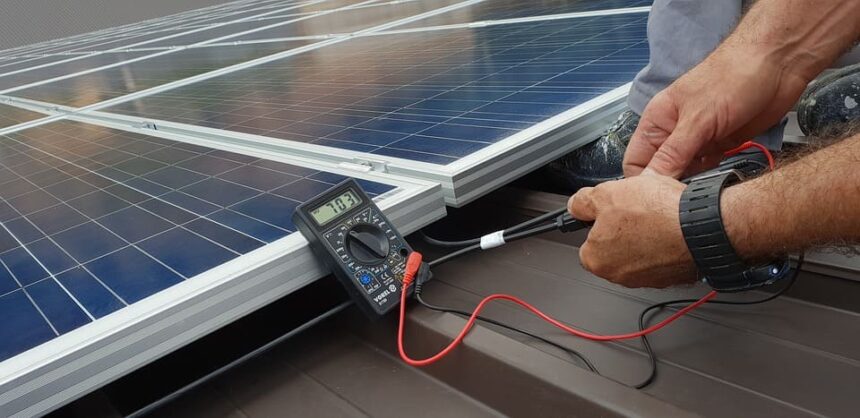Solar panels will function well, remain safe, and save energy when they are wired properly. Correctly wiring your solar panels can prevent significant mistakes, make sure power is directed where needed, and decrease the danger of hazards. This document helps newcomers wire their systems safely, with suggested methods and equipment from Renogy, and introduces the Electrician Referral Program for qualified professionals.
- Understand Series and Parallel Wiring
- Selecting the Right Wire Type and Size
- Tools and Equipment You Need
- Step-by-Step Wiring Process
- Why Renogy Is a Trusted Brand
- Common Wiring Mistakes to Avoid
- Testing and Verifying the Installation
- Join the Renogy Electrician Referral Program
- When to Seek Professional Help
- Conclusion
Understand Series and Parallel Wiring
Building a solar system first involves learning about how series and parallel wiring are used. Separate solar panels are connected one after another in series so that the positive terminal of one attaches to the negative terminal on the following panel, raising the voltage and keeping the current unchanged. With this arrangement, you can handle systems running over long wires and needing higher voltages. When parallel wiring, every positive terminal is connected, as well as all negative terminals, so the voltage remains the same and the current grows—perfect for low voltages and batteries. What you need your inverter for and what the system ought to accomplish will determine your decision. Understanding how to wire your solar panels correctly depends on choosing between these two setups based on your system’s needs.
Selecting the Right Wire Type and Size
After you decide on the wiring technique, picking the correct kind and size of wire is very important. The wire must prevent the current from causing either voltage drops or overheating. Solar wires made for outdoor use, like PV wire and USE-2, are preferable outdoors. Determine the correct gauge by dividing the system’s total current by the length between the components. All Renogy panels and kits have detailed specifications, guaranteeing they are installed safely. Picking the right wire is necessary and cannot be ignored when you are learning to wire your solar panels.
Tools and Equipment You Need
You will need some MC4 connectors, a multimeter, wire cutters, crimping tools, and both fuses and breakers to wire your solar panels. Appliances and tools support safe wiring, let you check the current and voltage, and act as a safety net against excess loads. Renogy puts together complete solar kits, including all these items, to make your solar panel installation much simpler. Safety and better efficiency are achieved when the proper appliances are used for wiring your solar panels.
Step-by-Step Wiring Process
First, install your panels and make a choice between series and parallel wiring. Make sure the polarity is the same when you seal the panels with MC4 connectors. If necessary, send the wires to a combiner box, then to the charge controller, and from there to the inverter (and battery bank if required). Protect all connections by using the suitable rating of breakers or fuses to prevent overcurrent damage. First, use a meter to check the voltage and then the continuity of the device before turning it on. Doing each step accurately matters a lot when you’re learning how to wire your solar panels in the best way.
Why Renogy Is a Trusted Brand
Renogy is a recognized company in the solar industry because they offer top-quality solar panels, wiring accessories, charge controllers, and inverters. All of their products are crafted for ease of use, whether you are a homeowner or a professional. Renogy provides links to wiring guides and diagrams, along with support resources to help you wire your solar panels accurately. If you select Renogy components, your system will work well together and be easier to maintain.
Common Wiring Mistakes to Avoid
If connections are wrong, the whole system may not work properly or might fail. A regular blunder is getting series and parallel wiring mixed up, resulting in incorrect voltages or currents. If the wire is too small, it can cause the temperature to increase and decrease the voltage. Another concern is when polarity isn’t matched correctly, which can ruin the charge controllers or inverters. It’s important to test the voltage of any circuit before making connections and never ignore grounding. You must make sure your setup is accurate and checked twice when wiring your solar panels to ensure they are safe and work well.
Testing and Verifying the Installation
Once wiring ends, check the output of both individual panels and the array set with a multimeter. Verify that the connections are continuous, that a short circuit has not occurred, and that they are not loose. During the first few hours, observe how both the charge controller and inverter are working. Testing checks if your system is working as intended and allows you to spot issues before they do real harm. All top guides to installing solar panels say to perform tests after the wiring has been completed.
Join the Renogy Electrician Referral Program
If you’re a licensed electrician or are advancing your expertise in solar energy, now is the perfect time to Join Electrician Referral Program and take your career to the next level. This initiative connects qualified professionals with customers seeking reliable help for solar installations, maintenance, and system upgrades.
Program Overview
To get started, electricians need to submit a valid electrician’s license or an electrical engineering degree, along with a link to their Facebook profile. Once accepted, you’ll receive a personalized referral link through the Impact platform. By sharing this link, you can promote Renogy’s solar products and earn rewards for each successful referral.
What You’ll Gain as a Partner
- Earn 7% Commission: Receive 7% cashback on the net purchase amount (excluding taxes and shipping) for every qualifying order.
- Special Discounts: New partners can enjoy 50% off their first order. Returning electricians get a one-time $300 discount on a future purchase.
- Promotional Support: Gain access to professional marketing tools, promotional materials, and tutorial videos to help you succeed in spreading the word.
- Customer Benefits: Your referred clients will receive exclusive discounts and may also be directed back to you for installation support.
When you Join Electrician Referral Program, you not only grow your business and expand your professional network, but also stay ahead in the booming solar industry—all while helping clients access quality, dependable solar solutions.
When to Seek Professional Help
DIY solar panel wiring is possible for some, but a few cases will need a trained professional. Connecting the system to your utility grid, working at high voltages, and following area electrical regulations can be too complicated for a newcomer to solar energy. When you call a licensed electrician for such work, you know it will be performed safely and as the law requires. Homeowners looking for professional installers can use the Electrician Referral Program from Renogy so their solar installations are safe and work well.
Conclusion
Knowing how to wire your solar panels is something every DIY solar enthusiast needs. When you pick the right wiring option, work with the needed tools, avoid missteps, and purchase top-quality equipment from Renogy, your system will be reliable, durable, and safe. Being an electrician or solar professional is a great way to use Renogy’s Join Electrician Referral Program and team up with a well-known solar brand. Having the wiring done right is important for both homeowners and professionals because it forms the basis for a good solar energy system.














